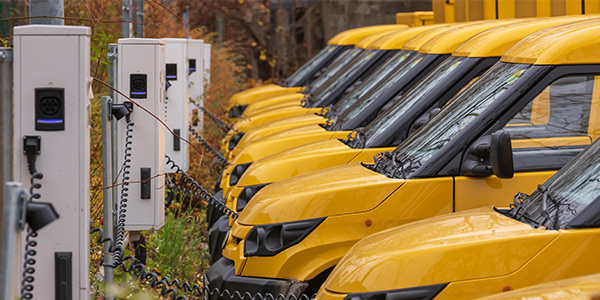The Massachusetts Department of Energy Resources (DOER) on Tuesday designated $10 million in rebates for purchases of medium- and heavy-duty electric trucks.
Purchases of private, commercial and government fleet vehicles made on or after Feb. 16 will be eligible for rebates ranging from $7,500 for pickup trucks to $90,000 for tractor trailer trucks. The rebate values will decrease over time based on expected declines in prices of electric vehicles as major manufacturers such as General Motors, Daimler, Peterbilt, Kenworth and Volvo bring electric trucks to the market later this year.
“The expansion of the successful MOR-EV program to include trucks continues the progress we have made in the Commonwealth to reduce harmful greenhouse gas emissions and make clean transportation more financially viable for residents and businesses,” Gov. Charlie Baker said in a news release.
The new subsidies for trucks build on the state’s MOR-EV program, which has offered rebates for EVs since 2014, dolling out $37 million in rebates and incentivizing the purchase of 18,000 EVs.
The Baker administration allocated $54 million to the program for 2020 and 2021.
“Reducing emissions from medium- and heavy-duty vehicles will help to improve air quality and act as a catalyst as we continue to transition from carbon-intensive transportation options toward cleaner and more environmentally friendly vehicles,” Energy and Environmental Affairs Secretary Kathleen Theoharides said in a statement.
In December, Baker joined a pact with Connecticut, Rhode Island and D.C. to reduce motor vehicle pollution by at least 26%.
DOER Commissioner Patrick Woodcock said the proposal to expand the rebate program to trucks was initially proposed to a group of manufacturers and dealers last fall and amended with feedback.
The department is relying on the manufacturers to make the rebate program, as well as the incremental drop in rebate value, known to buyers, Woodcock said.
The rebate values were based on numbers provided to the state by a local transportation company. The cost of a smaller diesel box truck on the market is about $55,000, and the electric version is about $165,000.
Even with the rebate, purchasing a new electric truck is still more expensive. But Woodcock said companies should shoulder the upfront cost for the lower maintenance and fuel costs of EVs.
The trucking and transportation industry is “looking to be part of the Commonwealth’s climate solutions,” Woodcock said.
“Electrification is the future,” and trucking and transportation companies would be “naïve if they didn’t see it,” Kevin Weeks, executive director of the Trucking Association of Massachusetts told RTO Insider.
However, a $90,000 rebate is only doable for “the biggest of the big,” such as the U.S. Postal Service, FedEx and Amazon, Weeks said.
Large tractor trailer trucks cost between $100,000 and $150,000, but an electric tractor trailer costs close to $300,000. Even with the rebate, buyers are still facing $75,000 or $85,000 more in costs.
And most electric tractor trailers can only travel up to 300 miles before they need to recharge, which is not sustainable for long-haul trucks that go about 600 miles per day.
The rebate program is “awesome for smaller trucks,” such as those used by USPS, since they only go up and down neighborhood streets, Weeks said.
The specific charging infrastructure large tractor trailers need is not available in the state, he added.
The fast-charging stations in Massachusetts built by companies like Eversource cannot charge semi-trucks, Megha Lakhchaura, director of policy and utility programs for EVBox North America, told RTO Insider.
“Trucks charge in a very specific way, and it requires a lot of planning,” Lakhchaura said.
Massachusetts will need to work with utilities to build up the capacity to charge trucks on a large scale and propose a program for companies and site hosts to install charging components, she said.
Programs for incentivizing electric trucks in places like California are effective because the southern part of the state has developed the heavy-duty charging infrastructure needed to support trucks.
Some members of the Trucking Association of Massachusetts purchase about 20 new vehicles per year. In a couple of years, they will purchase two or three EVs in one year, but at the current prices, it is not feasible for them to do so, Weeks said.
“The barriers to entry are still there, but things will change,” he said. “We’re appreciative of the rebate, but I don’t think you’ll see many people jumping at a $90,000 rebate for tractor trailers in Massachusetts.”




